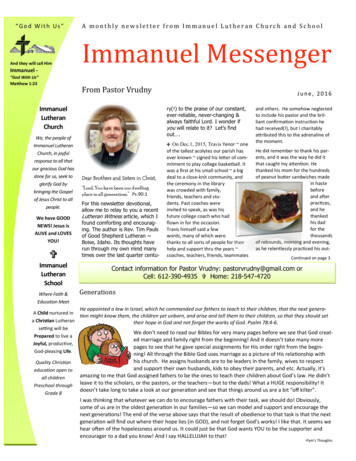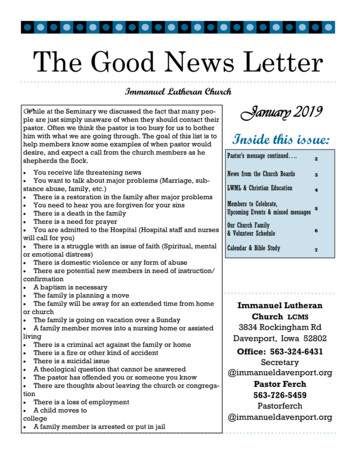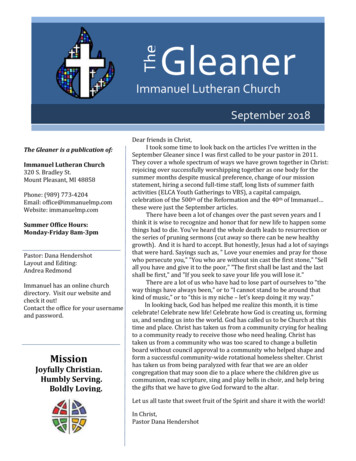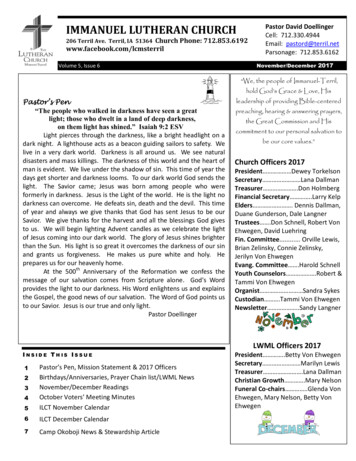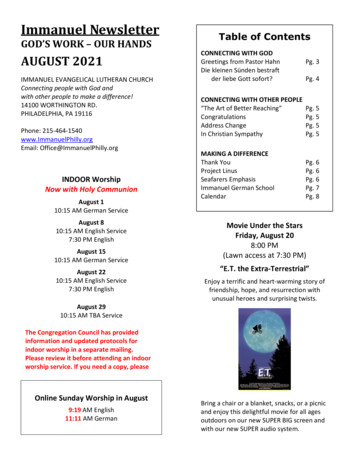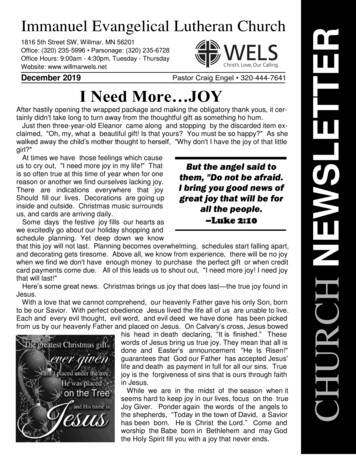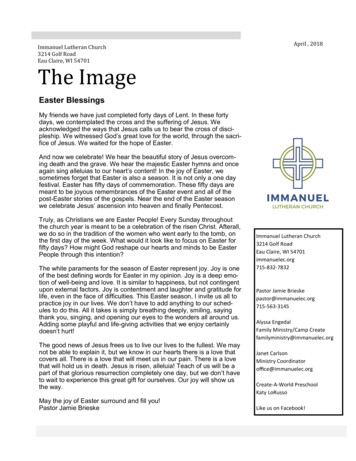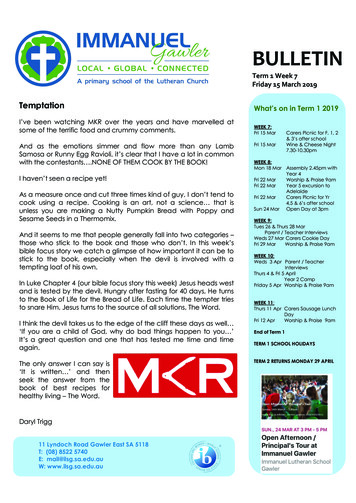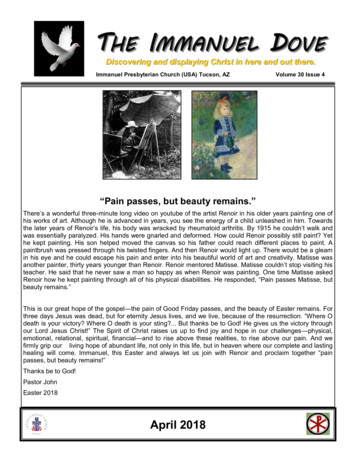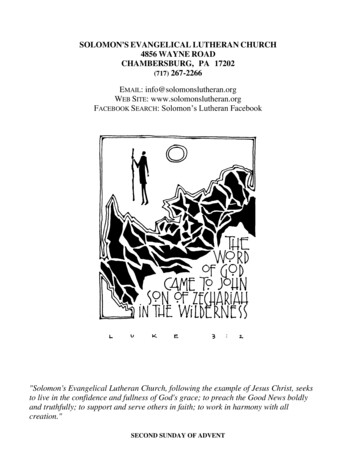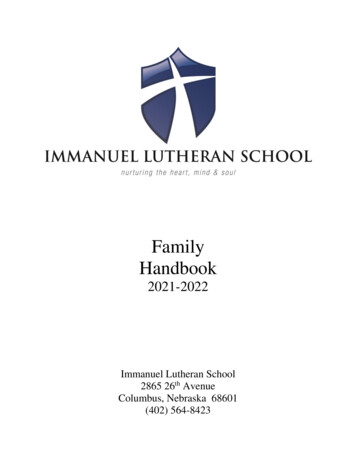
Transcription
FamilyHandbook2021-2022Immanuel Lutheran School2865 26th AvenueColumbus, Nebraska 68601(402) 564-8423
The ministry of Immanuel Lutheran School is to share Christby educating, nurturing, and equipping God’s people for a lifeof Christian service.INTRODUCTIONFinally, brethren, whatever is true, whatever is honorable, whatever is just, whatever ispure, whatever is lovely, whatever is gracious, if there is any excellence, if there isanything worthy of praise, think about these things. What you have learned and receivedand heard and seen in me, do; and the God of peace will be with you. (Philippians 4:8-9)Martin Luther urged men and women to prepare their children for a useful life in this world bygiving them a broad education. This broad education was to include two areas. The first was toraise children in the “spiritual realm” and the salvation of souls “through Jesus Christ”. Thesecond was for “the survival of the temporal government.” Immanuel Lutheran School has thissame goal today. We pursue spiritual and educational knowledge as redeemed people in JesusChrist our Lord. We dedicate ourselves to teach our children about God and His creation.The purpose of the Student/Parent Handbook is to provide to all students and their parents a setof guidelines for such spiritual, educational knowledge in and around Immanuel LutheranSchool. The handbook should be read by or to every parent and student. We recognize that it isimperfect and silent on some issues which may arise. In cases of disagreement about a particularinterpretation or implementation of certain rules, the Principal and/or the Board of ChristianEducation, after discussion with the parent and/or student, will render decisions that they deemfair to both students and the school. Through communication, application of the Law andGospel, and prayer, it is our intent to deal with one another in the love that Christ first showedus.Jody Timm - Principal-2-
TABLE OF CONTENTSIntroductionTable of ContentsMission StatementPhilosophySchool MapGovernanceAccreditationThe School DaySchool HoursSchool EntranceBefore SchoolDuring School HoursAfter SchoolChapelAdministrative PoliciesEnrollment ProceduresTuition and FeesRecourse/GrievanceAuthority and DisciplineDiscipline PolicyPreventionCorrectionTermsStudent ConductGeneral ConductBullyingProbationIn-School SuspensionSuspension from SchoolExpulsion from SchoolViolationsAcademic PoliciesCurriculumEighth Grade AlgebraTexts and Library BooksHomeworkInternet Access & Safety PolicyTestingAcademic IntegrityDiagnostic Testing and ReferralAchievement TestsGradingHonor RollGrade ReportingIncomplete Work/GradesPromotion and RetentionStudent Cumulative RecordsUniform Dress PolicyDress CodeConsequences for Dress Code ViolationsPersonal AppearanceGym ShoesGym ClothesLabel 616161717181818191919202020202122222223232323-3-
ProceduresAttendanceExcessive AbsenteeismTardinessChurch and Sunday School AttendanceIllnessIllness or InjuryMedicationHealth RequirementsInsuranceDrop-Off and Pick-UpSevere WeatherCold Weather Recess GuidelinesCommunicationPTLS (Parent and Teachers of Lutheran Schools)ExtravaganzaLockersField TripsSupply KitsFund-RaisingAfter School SupervisionTelephone UsePhones and other Personal Electronic DevicesLibraryMusic/ChoirBandLunchAnimals at SchoolEmergenciesCrisis/Emergency PlanEmergency Phone NumbersWeather EmergenciesOther ProgramsSchool Pictures, DARE, GREAT, 8th Grade Graduation,Musical Programs, Kindergarten Recognition,Gathering of the Talents, Field Day,Outdoor Education, 8th Grade Class Trip,Chapel Projects, Picnics, AthleticsPre-School/DaycareImmanuel Preschool/DaycareFamily Matters DaycareFirst Steps Infant and Toddler CenterGovernment ComplianceAccreditation and ApprovalAsbestosInstructional HoursLeadAbuse and Neglect ReportingNondiscriminatory PoliciesRights of Non-Custodial ParentsSexual Harassment PolicySmoke – Free and Drug - Free WorkplaceWeapons PolicyPropertyTreasures from HomeSchool PropertyBicyclesPersonal ItemsOther Ways to Help Your 3343434343535353535
MISSION STATEMENTThe ministry of Immanuel Lutheran School is to share Christby educating, nurturing, and equipping God’s people for a life of Christian service.PHILOSOPHYImmanuel Lutheran School has been established as a tool for accomplishing the GreatCommission to go and disciple all people. The school, as an integral part of Immanuel LutheranChurch, adheres firmly to the following scriptures:“Go and make disciples of all nations, baptizing them in the name of the Father and ofthe Son and of the Holy Spirit, and teaching them to obey everything I have commandedyou.” Matthew 28:19“Train up a child in the way he should go, so that when he is old he will not depart fromit.” Proverbs 22:6Immanuel believes and teaches that the Bible is the true Word of God without error andthat we are saved by grace through faith in Christ Jesus alone.Immanuel Lutheran School will educate each child in a Christ-centered atmosphere,providing faith-integrated academics that empower students to function with confidence in Christthrough all life’s situations.Immanuel Lutheran School will provide an environment where each student, regardlessof race, creed, or gender, will develop spiritually, intellectually, socially, emotionally, andphysically according to his/her God-given abilities. Immanuel will provide diverse experiencesand relevant curricula allowing for optimum achievement and development and enabling eachstudent to become a productive and participating Christian citizen in a democratic society.Worship and learning experiences in the church and school will develop and sustain each child’sfaith. Immanuel Lutheran School will work closely with the family and the church to completethis task.Immanuel Lutheran School will support the students in the process of lifelong faithformation. We strive to nurture, teach, and encourage ways to recognize and incorporate thepresence of God into our daily life experiences. It is our responsibility as stewards of youngChristian minds to provide a strong, solid foundation well-grounded in God’s Word, the Bible.We do this by teaching the Word of God, worshiping together, and reaching out to serve oneanother.-5-
PS 4PS 3DDFurnaceRmBBKitchenPS 5StorageHallwayOfficeDC1Office DC2NorthCCRe stroo msComputerRoomAABasement - South EndGymGirls LockerIMMANUELLUTHERANSCHOOLBoys LockerConcessionStandUtilityRoomGHFIEGirls StorageRestroomSchoolOfficePrincipalOffice2865 26TH AVECOLUMBUS, NE 68601402.564.8423Boys FacultyRestroom LoungeLOCATION KEYDCBoysStorageGirlsBAABCDEFGHI-6-Activity Room2nd GradeKindergarten1st Grade5th Grade6th Grade Homeroom7th Grade Homeroom8th Grade HomeroomLibraryAABBCCDDPS 3PS 4PK 5PK 5AMusic/BandLunchroom4th Grade3rd GradePlayschoolPreschoolPre-KPre-K
GOVERNANCEImmanuel Lutheran School is an independent school owned and operated by Immanuel LutheranChurch of the Lutheran Church Missouri Synod, Columbus, Nebraska, in compliance with stateand local laws. The Board of Christian Education (BCE) is responsible for the acquisition of allstaff and faculty as prescribed in the congregation’s constitution and bylaws, for establishing andoverseeing the policies and procedures of the school, and for working with the congregation’sBoard of Property Management to provide for the improvement and maintenance of all schoolphysical plant and properties. The BCE meets in the evening on the third Monday of eachmonth. BCE meetings are open except when in executive session. Immanuel and PeaceLutheran Churches entered into a multi-year agreement for school operation including policygovernance and funding. Since 2008 the BCE is comprised of five Immanuel members and fourPeace members. The principal is responsible for implementation of policies, formation ofcurriculum, supervision of instruction, and organizing and managing the day-to-day operationsof the school and preschool.ACCREDITATIONImmanuel Lutheran School is accredited by the National Lutheran Schools Accreditation(NLSA) and is approved by the State of Nebraska. Immanuel Lutheran School fills its teachingpositions with highly-qualified teachers by virtue of a combination of academic degrees, teachercertification, experience, and demonstrated ability to teach. Nationally-normed standardizedtests are administered each year to grades 2-8.THE SCHOOL DAYSCHOOL HOURS7:30 a.m.7:40 a.m.7:55 a.m.3:05 p.m.3:20 p.m.Students allowed in the vestibulesStudents allowed in classroomsClasses beginClasses end, students are dismissedStudents must be picked up by this timeSCHOOL ENTRANCEFor the safety of the students and staff, school entrances will be locked. All visitors tothe school must be “buzzed in” at the office entrance on the west side of the school. Uponentrance you will be asked to check in at the school office. This procedure helps schoolpersonnel to know who is in our building and the purpose of the visit.BEFORE SCHOOLIf it is necessary for a child to go beyond regular school hours, arrangements should bemade with the child’s teacher and/or the principal beforehand. Once the child has arrived on theschool grounds, he/she is to go immediately into the building. Affordable daycare is availableon-site both before and after school for students through twelve years of age.-7-
DURING SCHOOL HOURSStudents are not to leave the school premises during school hours without priorpermission from parents/guardians. The office staff would prefer written notices from aparent/guardian concerning appointments scheduled during the school day.AFTER SCHOOLClasses are dismissed at 3:05 p.m. All students should leave the premises promptly afterdismissal. There is no play period after school, so children waiting for rides are to wait with theon duty teacher by the appropriate door (south, west, or east). At 3:20 p.m. all students shouldbe either picked up, walking home, or attending daycare. Parents/guardians are asked tocooperate fully by picking up their children punctually. Affordable daycare is available on-sitefor all students through twelve years of age.CHAPELChapel services are held weekly, usually on Wednesday mornings at 8:05 a.m. Theteachers, pastors, and classes lead these mid-week worship opportunities. Parents, grandparents,etc. are welcome and encouraged to join us for chapel. The time, date, and chapel presenters arelisted each week in the principal’s message in the school newsletter.ADMINISTRATIVE POLICIESENROLLMENT PROCEDURESParents or guardians wishing to enroll students at Immanuel Lutheran School must fillout a student application for each student. Each application must be accompanied by a 50 fee.A meeting with the principal and teacher of the student and parents is conducted. Parents orguardians will be notified of acceptance by the principal. Parents/guardian must sign for thereceipt of the Parent/Student Handbook.Immanuel Lutheran School does not discriminate against any students on the basis of sex,race, or ethnic background. Enrollment is not limited to Lutherans, and Immanuel welcomesfamilies of all faiths. Religious instruction; however, will be taught exclusively in accordancewith the Holy Bible and the Book of Concord while respecting the denominational preferences ofnon-Lutherans. Because of limited class size and with regard for those partner churches who areinvesting their monies and time in Immanuel Lutheran School, priority for enrollment will begiven first to families who are members of Immanuel Lutheran Church, Peace Lutheran Church,and to all families who are currently enrolled at Immanuel Lutheran School. Enrollment is thenopen to the general public on a first-come-first-served basis.All new students are enrolled on a 90 school days probationary period (equal to one fullsemester). If needed, a conference is held during this period with the teacher, principal, andparents to determine continued enrollment for individual(s) whose overall performance needsevaluation.Mid-Year Enrollment: Students are enrolled mid-term on the condition that they provideall necessary application documentation and meet all school standards for conduct and-8-
performance. After an interview with the parent/guardian and student, the principal will notifythe family of the acceptance decision.According to Nebraska law, students may enter kindergarten if they turn five years of ageon or before July 31st of the year of enrollment into kindergarten; however, children bornbetween August 1st and October 15th of the year of enrollment may apply for early entrance intokindergarten. Application for early entrance must be made by April 15th of the year ofenrollment to Columbus Public Schools Office of Student Services at 402-563-7000, ext. 12123.CPS will conduct school readiness assessments to determine if the child is eligible for earlyenrollment.Immanuel Lutheran School reserves the right to place students in the appropriateinstructional level as determined by diagnostic data and developmental maturity.TUITION AND FEESTuition is necessary for the financial operation of the school. Actual cost of education foreach student is about 5,500. However, through the generous financial support of Immanuel andPeace Lutheran Churches, actual tuition rates are much less. Limited amounts of tuitionassistance and scholarships are available to families based on financial need. It is our desire thateveryone who desires a Christian education at Immanuel will be able to attend.All tuition and fees are technically due in advance, payable on or before the first day ofclasses. An installment payment option for tuition is available at the time of registration. Thefirst of these payments is made at the beginning of August at registration and the remaining ninepayments must be paid each month from September to May. A twelve-month plan is alsoavailable. Payments are made through our tuition management system (presently FACTSTuition Management Services). A late fee is charged on all payments past due. The businessmanager handles all tuition payment issues at the Immanuel church office.Any family facing an unexpected financial emergency such as illness, accidents or theloss of a job, should contact the Principal or the business office. When these situations occur theschool will work with the family to ease their burden and avoid a record of tuition delinquency.RECOURSE – GRIEVANCENormally all reasonable decisions and actions of the teachers regarding classroommanagement are final and should be received in a gracious way by students and parents even ifthe results of those decisions and actions were not what were anticipated. Similarly, all decisionsand actions of the principal regarding school policy procedure are final.If, however, the matter is of a more serious nature and the parent/guardian is dissatisfiedwith the outcome, they may contact the teacher or principal for a respectful discussion. The ruleof Matthew 18 should direct our words and actions. If the issue concerns a teacher, then theteacher should be contacted before the principal. Likewise, issues concerning the principalshould first be brought to the attention of the principal. If these steps are followed, mostconflicts can be resolved in an appropriate and God-pleasing manner.-9-
If there is no resolution after the meeting with the teacher and/or principal, the mattermay be taken to the chairperson of Immanuel’s Board of Christian Education, presentingconcerns formally in writing. The Board of Christian Education requests that itemsparents/guardians wish to bring before the board, be presented to the chairman no later thanWednesday of the week before the regular board meeting. Regular board meetings are typicallyheld on the third Monday evening of each month.Under no circumstances is it beneficial nor acceptable to use social media to voiceconcerns about a student, parent, staff member, or volunteer. The administration and Board ofChristian Education take very seriously the responsibility for the entire Immanuel School familyto deal with one another in a spirit of Christian love and maturity.AUTHORITY AND DISCIPLINEWe believe that children’s lives, discipline, and upbringing are ultimately entrusted bythe Lord God to their parents. This relationship is testified to in the Bible:(Deuteronomy 6:6-7)” And these words which I command you this day shall be uponyour heart; and you shall teach them diligently to your children, and shall talk of themwhen you sit in your house, and when you walk by the way, and when you lie down, andwhen you rise.”(Ephesians 6:1-4) “Children, obey your parents in the Lord, for this is right. ‘Honor yourfather and mother’ (this is the first commandment with a promise), ‘that it may be wellwith you and that you may live long on the earth.’ Fathers, do not provoke your childrento anger, but bring them up in the discipline and instruction of the Lord.”(Colossians 3:20-21) “Children, obey your parents in everything, for this pleases theLord. Fathers, do not provoke your children, lest they become discouraged.”The authority and discipline maintained in the school is viewed as the extension andaugmentation of parental authority and discipline. Martin Luther explains the FourthCommandment, “We should fear and love God so that we may not despise our parents andmasters, nor provoke them to anger, but give them honor, serve and obey them, and hold them inlove and esteem.” The school faculty and staff do not function above parents but rather with theauthority delegated to them from the parents. This parental authority is delegated when parentsagree to the terms and conditions stated in this handbook for the care and education of theirchildren. The Bible states:(Proverbs 29:17) “Discipline your son, and he will give you rest; he will give delight toyour heart.”(Hebrews 12:5-11) “And have you forgotten the exhortation which addresses you assons? ‘My son, do not regard lightly the discipline of the Lord, nor lose courage whenyou are punished by Him. For the Lord disciplines him whom he loves, and chastisesevery son whom he receives.’ It is for discipline that you have to endure. God is treatingyou as sons; for what son is there whom his father does not discipline? If you are leftwithout discipline, in which all have participated, then you are illegitimate children andnot sons. Besides this, we have had earthly fathers to discipline us and we respected- 10 -
them. Shall we not much more be subject to Father of spirits and live? For theydisciplined us for a short time at their pleasure, but he disciplines us for our good, that wemay share His holiness. For the moment all discipline seems painful rather than pleasant;later it yields the peaceful fruit of righteousness to those who have been trained by it.”Discipline at Immanuel is not considered in negative terms. Discipline is understood to be firm,loving admonition and training to know and do what is right. It has absolutely nothing to dowith physical or verbal abuse, or manipulation of behavior by intimidation and ridicule. Rather,it has reasonably unpleasant consequences for poor choices or inappropriate behavior to deterthem in the future while offering encouragement and positive examples to achieve success.DISCIPLINE POLICYPIPSS (Performance Improvement Problem Solving Systems)PREVENTIONBefore a classroom discipline policy is enforced, teachers implement five steps that helpincrease student performance of goal behaviors and decrease the likelihood of studentperformance problems. Over a one to two week practice period, teachers prepare students forclassroom discipline policy enforcement by working through the following steps: State the expected performance goal behaviors. Teachers explain what each goal meansto them and describes why the goal is important for each student. There are five studentperformance goals:oooooArrive to class on-timeUse work time appropriatelyComplete assigned tasks on-timeDemonstrate respect for people and/or propertyRespond appropriately to staff directives Teach the expected performance goal behaviors. Teachers explain how students shouldperform each goal behavior successfully. State the tolerance for misbehavior. Teachers explain the extent to which studentmisbehavior will be tolerated in the classroom. Provide practice opportunities. Teachers provide students with time to practice theperformance of the goal behaviors in the classroom. Provide performance feedback. Teachers provide students with feedback so theyunderstand the accuracy of their performance before the policy is implemented.- 11 -
CORRECTIONAfter the classroom teacher has prepared students, PIPSS discipline policy is enforced.The PIPSS model is designed purposefully so the degree of home-school supervision andproblem solving support are directly related to student performance choices. In this step by stepprocess, supervision and problem solving support are increased proportional to problem intensityuntil the academic and/or behavior problem is resolved or an appropriate educational setting isidentified. The system is also constructed to minimize the loss of student freedoms and choices.There are three levels of problem solving: Level I – Classroom Team; Level II – StudentAssistance Team; Level III – Multi-Disciplinary. The following sequence of activities will occurat each level within this system:1. When a student fails to adequately perform a goal behavior, the student will receive aconsequence and be required to complete a problem-solving lesson. During the problemsolving lesson, students write responses to the following statements: Which of the goals did I not perform appropriately? My behavior caused a problem because . I will take the following two or three actions to correct the problem If I choose not to perform according to the five student goals, I will experience theseconsequences .A copy of the lesson is mailed to a parent so they can discuss the problem behavior withtheir child at home.2. When a student fails to perform a goal behavior a second time for a particular teacher,he/she will receive a consequence and be required to complete a problem-solving lesson.After the problem-solving lesson is completed, a copy of the lesson will be mailed to aparent so they can discuss the problem behavior with their child at home.3. When a student fails to perform a goal behavior a third time for a particular teacher,he/she will receive a consequence and be required to complete a problem-solving lesson.After the problem-solving lesson is completed, a copy of the lesson is mailed to a parentso they can discuss the problem behavior with their child at home. The student is requiredto call a parent to explain how his/her behavior created a need for a mandated meetingwithin five school days. The student is expected to attend the parent-teacher problemsolving meeting. After receiving a third problem solving for a particular teacher, he/shemoves to the next level for all teachers.The purpose for a parent-teacher problem solving meeting is to develop an action plan toresolve the student’s difficulty. During this 20 to 40 minute meeting, parents, teachers andstudents identify the problem, generate solution ideas, develop a home-school action plan, selectan indicator of plan success, assure that each participant understands their part in the plan, andselect a time to review the plan.Normally, teachers will note the breaking of these rules with a name or mark beingwritten and will note the keeping of these rules with positive reinforcement. Sitting quietly,paying attention, asking questions respectfully and working hard will be encouraged bycompliments. Getting out of seat without permission, talking out of turn, complaining, makingunnecessary noise, or other behaviors which distract from the teaching process will be noted withconsequences to follow. Teachers will have consequences for marks posted and explained.- 12 -
TERMSDisciplinary Action – assists the student in becoming more aware of appropriate behaviorand increases opportunities to grow and learn as Jesus has taught us. Immanuel’s disciplinaryactions include problem solving forms and solutions as an important part of the process. Anydisciplinary action taken will comply with existing state statutes, school board policy, and shallafford due process of law. Each child will be treated as an individual. The types of disciplinaryaction that may be taken include the following:Guidance – a conversation between the student and school personnel. The purpose ofthis form of counseling is to inform the student that behavior needs to change so that the studentdoes not violate the rights of others or harm himself/herself.Problem Solving Forms – a communication tool between home and school. Problemsolving forms are used to inform parents about the behavior so that the parent and child candiscuss the behavior and make a plan for future action. The forms will also include action thatstaff members felt were appropriate at the time of the incidence.Conference – a meeting of student’s parent(s)/legal guardians(s) and school personnel todiscuss the student’s behavior. The child may be asked to attend by either the parent or schoolpersonnel. Conferences may also be set up at any time upon the request of school personnel orparent.In-School Suspension – forced, temporary withdrawal of a student who will be isolatedfrom the events of a normal school day and be expected to complete extra assignments.Suspension – forced, temporary withdrawal of a student from school.Student Counseling – some actions may require a student to visit a guidance, medical, orpsychological counselor to assist the student in resolving problems.Restriction of Activities – at the teacher’s discretion, a student may not be allowed toparticipate in certain activities due to past or present behavior. Parents will be notified whenpossible.School Probation – action taken by the principal and teacher to assist the student inresolving educational problems. The action is in the form of certain stipulated conditions agreedupon by the school, student and parent(s)/legal guardian(s).Expulsion – forced permanent withdrawal from school.Corporal Punishment – teachers, administrators, and school staff may not use physicalpunishment to discipline a student for any reason.Use of Force – teachers, administrators, and school staff may use forceful restraint toprotect students from harm.- 13 -
Behaviors that lead to disciplinary action may include but are not limited to: Disruption in class, in the lunchroom, or during any school activities. Disrespect for authority – pastor, principal, teachers and their aids, librarian, schoolsecretary, custodian, and other personnel. Violation of safety or fire drill rules. Violation of lunchroom, playground, or classroom procedures. Disrespect for other students’ feelings and name-calling. Cheating on assignments, tests, or other activities Demoralizing conduct and/or use of vulgar language. Use of violence, force, intimidation, coercion, threats and all forms of bullying.STUDENT CONDUCTGENERAL CONDUCTStudents at Immanuel should make every reasonable attempt to conduct themselves in arespectful manner. The administration will discipline students when necessary for healthy growthand maturity. Students are expected to comply with the norms of the individual teacher,sponsors, and administrators. Failure to comply with these individual standards makes thestudent liable to reasonable consequences. Students must respect the rights of others to learn orperform their assigned tasks. Students must act in a manner which shall cast a positive lightupon themselves and their school. Students must behave in a manner that creates a safeenvironment.BULLYINGImmanuel is committed to providing a safe, loving environment free from abuse,harassment, bullying, or any other form of threatening, derogatory, or demeaning displays. Anystudent who experiences such, should inform his/her teacher, principal, or other staff person.Immanuel is also committed to train children in Christian behavior. Training includes how wetreat one another, practice verbalizing feelings, recognizing a victim, recognizing a perpetrator,asking for forgiveness and granting forgiveness. Allegations are taken seriously and investigatedto provide appropriate responses and discipline.More serious violations of the student conduct regulations will result in alternativeconsequences which may include the following: Probation Conference with parent and/or student In-school suspension, out-of-school suspension, or expulsionThe form used for this disciplinary procedure is the “Progressive Discipline Record”. Withcontinued violations, the consequential steps can be suspension and/or expulsion.PROBATIONProbation is defined as a time when a student will be observed more closely by staff tosee if he/she is cooperating with correction from school authorities. If, in the judgment of theadministration, the student is not growing and cooperating to the level of maturity that isexpected, the student will be recommended for suspension or expulsion.- 14 -
IN-SCHOOL SUSPENSIONParents will be notified of this action prior to its implementation and confirmed inwriting. During school hours, the student will be required to do all class work alone in adesignated area.The following procedures will be used if a student is placed on in-school suspension: The student will report to the office 15 minutes before school begins and will remain 15minutes after school ends.The student will be isolated from the remainder of the student body during the day.The student will be allowed to receive credit for work completed while on suspension butwill not be granted any extra time to complete assignments.No extra time will be given for lab work missed. The student will not receive a
Insurance 25 Drop-Off and Pick-Up 25 Severe Weather 26 Cold Weather Recess Guidelines 26 Communication 26 . COLUMBUS, NE 68601 402.564.8423 - 7 - GOVERNANCE Immanuel Lutheran School is an independent school owned and operated by Immanuel Lutheran
